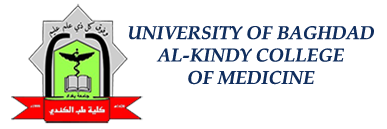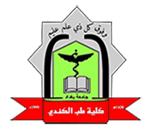Intoduction
There has been an increasing interest in all countries all over the world on the importance and relevance of primary health care and Family Medicine practice. The family physician is considered to be a central figure in this context. Moreover, the MOH started to implement Family Medicine program in Iraq science 2006 in many PHC centers all over the country, eventually there is a great need for a large number of Family physicians to cover the health care in the increasing number of Family Medicine Centers in Iraq. It is expected from a family physician to provide comprehensive continuous health care in a personalized manner to patients of all ages and to their families.
There are two types of diplomas
Higher Diploma in Family Medicine: (2 years)
Family Medicine Professional Diploma (1 year)
Admission Plan
2025 – 2026 Academic Year
Iraqi Students
- 5 General Seats
- 5 Tuition-Based Seats
- 7 Others
Non-Iraqi Students
- 2 General Seats
- 2 Tuition-Based Seats
Admission Plan
2024 – 2025 Academic Year
Iraqi Students
- 4 General Seats
- 4 Tuition-Based Seats
Non-Iraqi Students
- 2 General Seats
- 2 Tuition-Based Seats
Admission Plan
2023 – 2024 Academic Year
Iraqi Students
- 15 General Seats
- 10 Tuition-Based Seats
Non-Iraqi Students
- 2 General Seats
- 2 Tuition-Based Seats
Study In Iraq
Rationale for specialization in family medicine

Vision
The program reflects a vision of the family medicine specialist as a practitioner that can address most of common health problems. A family medicine specialist promotes health in primary health care centers in Iraq.
Goal
The study is committed to support the primary health care settings with specialist in family medicine who are qualified in the up-to-date knowledge in the field and who have the skills and ethics of the profession and who keep the noble social standards and morals in health care giving. This family-oriented physician can provide comprehensive integrated care to the population within their community, addressing physical, psychological, and social factors
Learning Objectives
At the end of the program, it is expected to have a physician specialist in family medicine that can fulfill the following job description criteria to:
- Demonstrates the value of continuing care with the patient and family. Develops relationships with patient and his family from all physical, social and psychological aspects and meet their needs and fulfill their expectations.
- Recognizes different health problems of the society & having the ability for priotarizing them. Identifies deficits in the environment when his patient in living or working.
- Demonstrates clinical competence in respect to diagnosis and management of acute and chronic problems commonly seen in primary care, using a holistic approach in recognizing the physical, the psychological and the social domains of problems.
- Takes required therapeutic and preventive actions to protect the life of individuals, families and a designated population group.
- Elevates the standard of health care to families and to the community& Follows standards of care or guidelines provided and attempts to update his knowledge by continuous medical education.
- Demonstrate skills of self-directed learning, critical thinking and evidence-based practice.
- Participates with community medicine as well as other specialties physician to
- Promotes the health team work.
- Ensure community participations in the planning, implementation and evaluation of health programs.
- Conduct health researches particularly community-based studies.
- Participate in training of health cane personals.
The program will be delivered full-time over two academic years in divided four semesters. Each semester contains different courses. The first semester consists of theoretical lectures and practical discussion in the essentials of community medicine to provide the basic knowledge and skills. The second and third semesters consist of practical training in the hospital about the common medical, surgical, gynecological and pediatric conditions besides other subspecialties (ENT, ophthalmology, Dermatology, clinical Lab and emergency units).
The fourth semester comprises practical and field training in primary health care center about different health activities. This semester is design to provide the basic knowledge & skills in management of common condition in primary health care setting.
At the end of the program, the Family Medicine specialist is expected to be able to:
-
Provide appropriate therapeutic and preventive care, and formulate diagnoses that reflect the patient’s physical, psychological and social dimensions.
-
Demonstrate the value of continuous, long-term care for the patient and the family.
-
Build and maintain strong professional relationships with patients and their families, taking into account their material, social and psychological circumstances.
-
Identify the major health problems in the community, set priorities for the most important issues, and recognize gaps or deficiencies in the living and working environment of their patients.
-
Contribute to improving the quality of health care for families and the community, by:
-
Applying and following available standards of care and clinical guidelines.
-
Continuously updating their knowledge and skills through continuing medical education (CME) activities.
-
-
Collaborate effectively with public health physicians in order to:
-
Promote health team work and inter-professional collaboration.
-
Ensure community participation in planning, implementing, and evaluating health programs.
-
Conduct health research, especially community-based studies.
-
Participate in the training of health-care workers and primary health-care staff
-


Goals & Objectives of the Course:
Institutional Goals
- To introduce the principles and concepts of family medicine.
- To explain the principles of health promotion and disease prevention.
- To illustrate the principles of documentation and medical records management.
- To discuss updates in the management of common medical problems in primary care.
Learning Objectives
At the end of the course, you will be able to:
- To adopt a bio-psycho-social model taking into account the cultural dimensions.
- To build an effective patient-physician relationship.
- To adopt a person-centered approach in dealing with patients.
- To act as advocate for the patient.
- To collaborate with patients in management decisions.
- To master effective and appropriate care provision and health service utilization.
- To monitor, assess and improve quality and safety of care.
- To provide cost-conscious medical care.
- To advocate for individual and community health.
- To provide longitudinal continuity of care as determined by the needs of the patient.
- To manage and coordinate health promotion, prevention, cure, care and palliation and rehabilitation.
- To demonstrate professionalism in dealing with others.
- To respect patient privacy and autonomy.
- To demonstrate compassion and respect to others.
- To demonstrate sensitivity to diverse population with no limitation to gender, age, culture, religion, and disability.
- To manage primary contact with patients.
- To manage conditions that may present early and in an undifferentiated way.
- To cover the most common health conditions prevalent in primary care.
- To adopt evidence based clinical information management: selectively gather and interpret information from history-taking, physical examination, and investigations and apply it to an appropriate management plan in collaboration with the patient.
- To use effectively and efficiently diagnostic and therapeutic interventions as needed.
- To refer to other health professionals and specialists as needed.
- To promote health and well-being by applying health promotion and disease prevention strategies appropriately.
Eligibility to the program
A physician graduated from Iraqi medical colleges; General Practitioners who spent at least 10 years in service in Primary Health Care.
Period of the study
The study will be one calendar year to cover academic and clinical on job training. This year will be divided into six blocks, two months for each block. The student should have theoretical sessions and on job training program in Family Medicine Centers. The program is a package compressed to fulfill the requirement expected from this specialization.
Description of the course
This is a 44-week course that aims at orienting General Practitioners on the principles and elements of primary care services including the clinical management of common medical problems. General Practitioners will be exposed to important concepts that are applied in primary care with emphasis on family medicine approach and they will be introduced to recent updates in the management of common medical problems. This will enable General Practitioners to provide a comprehensive, continuous and evidence-based patient-centered health care to individuals in their communities.
The course will start with an orientation in the first week followed by 4 main blocks spanning over a period of 44 weeks and followed by two exams, a written and an OSCE exam delivered during the remaining 3 weeks of the course. Only candidates who pass the written exam will be entitled to attend the OSCE exam. The blocks are divided into different weeks, whereby each week covers specific topics pertinent to primary health care.
During the course, General Practitioners will be attending web-based power point presentations at the rate of 3 topics per week for a total of 48 topics per course; they will be participating in online discussions on weekly basis; and they will be attending a one-day face-to-face live session during the last week of each block. General Practitioners are expected to complete assignments and quizzes that will be posted online throughout the period of the course.
Admission Statistics for Postgraduate Studies
| Specialty | Academic Year | Number of Accepted Students | General Admission Plan | Special Admission Plan |
|---|---|---|---|---|
| Higher Diploma / Medical Education | 2010-2011 | 3 | 15 | 5 |
| Higher Diploma / Medical Education | 2011-2012 | 12 | 15 | 5 |
| Higher Diploma / Medical Education | 2012-2013 | 8 | 10 | 5 |
| Higher Diploma / Medical Education | 2013-2014 | 8 | 10 | 5 |
| Higher Diploma / Medical Education | 2014-2015 | 10 | 6 | 5 |
| Higher Diploma / Family Medicine, Two Years | 214-2015 | 11 | 7 | 5 |
| Higher Diploma / Family Medicine, Two Years | 2015-2016 | 6 | 7 | 5 |
| Higher Diploma / Family Medicine, Two Years | 2016-2017 | 8 | 6 | 6 |
| Higher Diploma / Family Medicine, Two Years | 2017-2018 | 7 | 10 | 5 |
| Higher Diploma / Family Medicine, Two Years | 2018-2019 | 7 | 10 | 5 |
| Higher Diploma / Family Medicine, Two Years | 2019-2020 | 8 | 10 | 5 |
| Higher Diploma / Family Medicine, Two Years | 2020-2021 | 7 | 15 | 10 |
| Higher Diploma / Family Medicine, Two Years | 2021-2022 | 4 | 15 | 10 |
| Higher Diploma / Family Medicine, Two Years | 2022-2023 | 6 | 15 | 10 |
| Higher Diploma / Family Medicine, Two Years | 2023-2024 | 18 | 15 | 10 |
| Higher Diploma / Family Medicine, Two Years | 2024-2025 | 8 | 4 | 4 |
| Higher Diploma / Family Medicine, Two Years | 2025-2026 | 8 | 12 | 5 |
| Professional Higher Diploma in Family Medicine (Bridging), One Year | 2018-2019 | 2 | 10 | 0 |
| Professional Higher Diploma in Family Medicine (Bridging), One Year | 2019-2020 | 10 | 10 | 0 |
| Professional Higher Diploma in Family Medicine (Bridging), One Year | 2020-2021 | 4 | 10 | 0 |
Higher Diploma Admissions Statistics
Total Accepted Students
Total number of admitted students across all Higher Diploma programs and years.
Average per Year
Average number of accepted students per academic year.
Highest Intake Year
Highest intake recorded in 2014–2015.
Lowest Intake Year
Lowest intake recorded in 2010–2011.
By Admission Channel
214 seats (General) — 105 seats (Special) over all years.
By Specialty
• Higher Diploma / Family Medicine, Two Years – 98 students
• Higher Diploma / Medical Education – 41 students
• Professional Higher Diploma in Family Medicine (Bridging), One Year – 16 students




